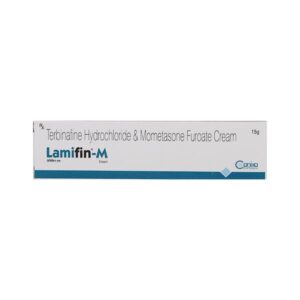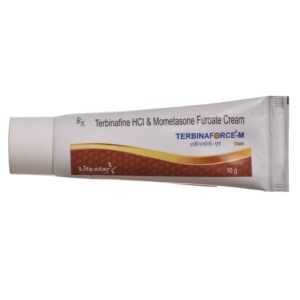MOMETASONE + TERBINAFINE
Mometasone: Mometasone is a corticosteroid drug that is used to treat various inflammatory conditions such as allergies, asthma, and skin disorders like eczema and psoriasis. It comes in various forms, including nasal sprays, inhalers, and topical creams or ointments.
The mechanism of action of mometasone involves its anti-inflammatory properties. It acts by binding to glucocorticoid receptors, which are present in most cell types throughout the body. By doing so, it suppresses the release of inflammatory substances and inhibits the activation of cells involved in the immune response, thus reducing inflammation and relieving symptoms.
For allergic rhinitis, mometasone nasal spray is typically administered as one or two sprays into each nostril once daily. For asthma, mometasone inhalers are usually prescribed as two inhalations twice daily. The exact dose and frequency of application may vary depending on the severity of the condition and the individual’s response to treatment.
The common side effects of mometasone can include nasal congestion, sneezing, throat irritation, nosebleeds, headache, and coughing (when used as a nasal spray). When used as an inhaler, typical side effects may include throat irritation, coughing, hoarseness, and oral candidiasis (yeast infection in the mouth) if proper technique and mouth rinsing are not followed. In topical form, side effects may include skin thinning, burning sensation, itching, and redness. It is important to follow the recommended dose and usage instructions provided by the healthcare provider to minimize the risk of side effects.
It is worth noting that corticosteroids like mometasone should be used with caution and under medical supervision, especially if used for prolonged periods, as they can potentially have systemic effects and may interact with certain medications. It is important to consult a healthcare professional before starting or changing the dose of mometasone or any other medication.
Terbinafine: Terbinafine, also known by the brand name Lamisil, is an antifungal medication used to treat various fungal infections. It is primarily used for the treatment of fungal infections of the skin, nails, and scalp.
Terbinafine works by inhibiting an enzyme called squalene epoxidase, which is involved in the synthesis of ergosterol, an essential component of fungal cell walls. By inhibiting this enzyme, terbinafine disrupts the fungal cell wall synthesis, ultimately killing the fungus or preventing its growth.
The dosing of terbinafine can vary depending on the type and severity of the infection. For most fungal infections of the skin, a daily dose of 250 mg of terbinafine is recommended for 2-6 weeks. Fungal infections of the nails typically require a longer treatment duration of 6-12 weeks.
Common side effects of terbinafine include gastrointestinal symptoms such as nausea, diarrhea, and abdominal pain. Less common side effects may include headache, dizziness, skin rash, taste disturbances, and fatigue. In rare cases, terbinafine can cause liver dysfunction, so regular liver function tests may be required during treatment.
It is important to note that terbinafine can interact with some medications, so it is essential to inform your healthcare provider about any other medications or supplements you are taking before starting terbinafine.
Overall, terbinafine is an effective antifungal medication for the treatment of various fungal infections. However, like any medication, it may not be suitable for everyone, and it is important to discuss your specific condition and medical history with a healthcare professional to determine if terbinafine is the right choice for you.


